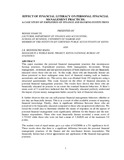| dc.contributor.author | NYAMUTE, WINNIE | |
| dc.contributor.author | MAINA, J.K. MONYONCHO | |
| dc.date.accessioned | 2013-02-14T12:48:07Z | |
| dc.date.available | 2013-02-14T12:48:07Z | |
| dc.date.issued | 2011 | |
| dc.identifier.uri | http://hdl.handle.net/11295/9897 | |
| dc.description | EFFECT OF FINANCIAL LITERACY ON PERSONAL FINANCIAL MANAGEMENT PRACTICES: A CASE STUDY OF EMPLOYEES OF FINANCE AND BANKING INSTITUTIONS | en |
| dc.description.abstract | This paper examines the personal f inancial management practices that encompasses
Savings practices, Expenditure practices, Debt management, Investment, Money
management , retirement and unexpected practices of both employees who are financially
educated verses those who are not. In this study, those who are financially literate are
those perceived to have undergone some level of financial training such as bankers,
accountants and auditors etc. The survey data was obtained from 192 employees using a
structured questionnaire. This study focused on the effect of financial education on
personal financial management practices. The results have shown that those who are
financially educated do practice to an extent the standard financial behaviors. A likert’s
mean score of 5 would have indicated that the financially educated perfectly understand
the impact of poor money management habits caused by lack of financial education.
It further observes that one can still practice financial management behaviors whether or
not they are financially literate. This is as a result of other available avenues of acquiring
financial knowledge. Finally, there is significant difference between those who are
perceived to be f inancially educated compared to those who are perceived otherwise. We
tested the overall data to determine whether the means of responses on all the aspects of
personal financial management were significantly different for the finance and the nonfinance
respondents. Those who were financially literate recorded a mean score of
3.753103 while those who were not had a mean of 3.364828 out of the maximum 5.0
points.
The student t-test of equal means gave a p-value of 0.029086 at a 5% significance level.
These results show that there is a significant difference between the personal financial
management practices of the finance and the non-finance literate respondents. The
financially literate had a better appreciation and application of the financial management
practices. It can be concluded that financial literacy influences personal financial management
practices. It is recommended that individuals should try to acquire some basic knowledge
of financial management to allow them to better manage their personal finances.
However, these recommendations should be applied bearing in mind the limitations of
the possible lack of representativeness of the sample used in this study. | en |
| dc.language.iso | en | en |
| dc.subject | FINANCIAL LITERACY | en |
| dc.subject | FINANCIAL MANAGEMENT | en |
| dc.title | EFFECT OF FINANCIAL LITERACY ON PERSONAL FINANCIAL MANAGEMENT PRACTICES | en |
| dc.title.alternative | A CASE STUDY OF EMPLOYEES OF FINANCE AND BANKING INSTITUTIONS | en |
| dc.type | Other | en |
| local.publisher | School of Business, University of Nairobi | en |

